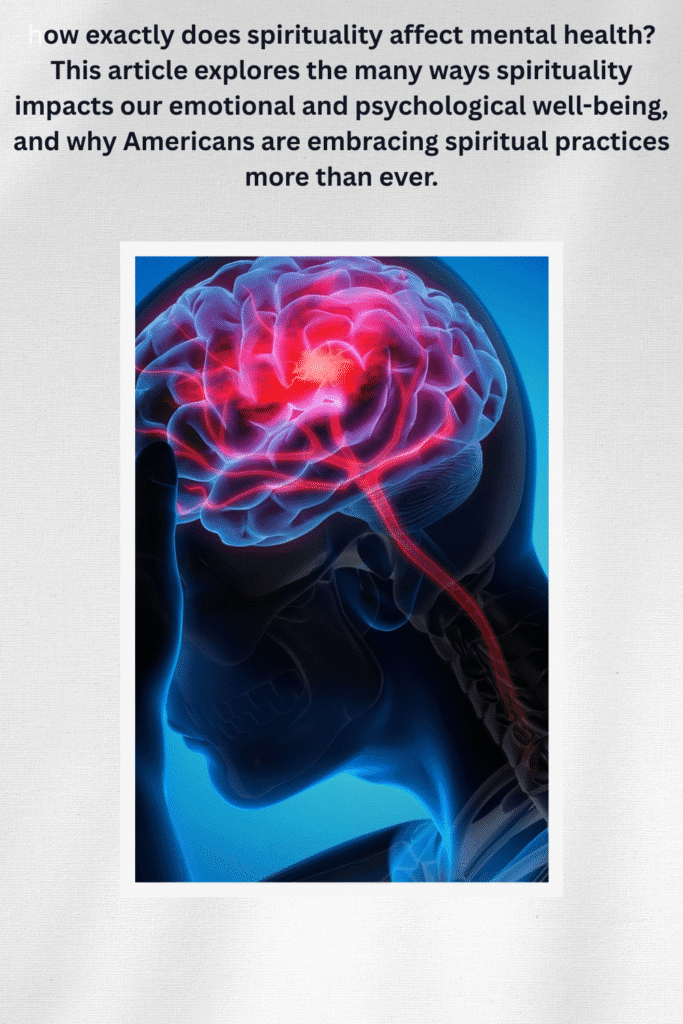spirituality affect mental health people in the United States are increasingly turning to spirituality as a means to manage anxiety, depression, and emotional turmoil. While religion and spirituality are often linked, spirituality is a broader concept that goes beyond organized faith.
It involves discovering one’s purpose, establishing a connection with a higher power, and nurturing a sense of inner tranquility. But how exactly does spirituality affect mental health? This article explores the many ways spirituality impacts our emotional and psychological well-being, and why Americans are embracing spiritual practices more than ever.

Table of Contents
What is Spirituality?
Spirituality is a personal and deeply individual experience that centers on a sense of connection—whether to God, the universe, nature, or one’s inner self. spirituality affect mental health,Unlike religion, which is often based on communal practices and doctrines, spirituality is more flexible and often focuses on personal growth, mindfulness, and a sense of purpose. In America, spirituality can take many forms—Christian devotion, mindfulness meditation, yoga, New Age beliefs, or even connection with nature.
The Connection between Spirituality and Mental Health
Over the last few decades, mental health professionals have increasingly recognized the importance of spirituality in healing. Numerous studies show that people who have a strong spiritual foundation tend to experience lower levels of anxiety and depression, cope better with life’s challenges, and feel a stronger sense of meaning in life.
1. Stress Reduction and Emotional Regulation
Spiritual practices such as prayer, meditation, and mindfulness help calm the nervous system. By focusing on the present moment or on a higher power, individuals can decrease cortisol levels, which are often elevated during stress. In the U.S., many therapists now recommend mindfulness meditation as a complementary treatment for stress-related disorders.
2. Sense of Purpose and Meaning
Many Americans feel overwhelmed by the pressures of work, family, and social expectations. Spirituality offers a sense of purpose and direction that can act as a compass during difficult times. When people believe their lives have meaning, they are less likely to feel hopeless or trapped.
3. Improved Coping Mechanisms
Spirituality helps people develop healthier ways of coping with grief, trauma, and adversity. For example, someone dealing with the loss of a loved one may find comfort in the belief that the soul continues to exist in another realm. This can ease the pain of grief and provide emotional resilience.
4. Community Support and Connection
Although spirituality is often personal, it can also be a powerful way to connect with others. spirituality affect mental health,Whether it’s attending a church, participating in a yoga group, or joining a spiritual retreat, these communities provide emotional support and reduce feelings of isolation—an important factor in mental health.
Spiritual Practices That Promote Mental Wellness
In the United States, spiritual practices have been increasingly integrated into daily routines and mental health care. Spirituality therapy USA.
Here are a few commonly used spiritual practices that positively affect mental health:
– Meditation
Meditation encourages a quieting of the mind. Regular meditation has been shown to increase gray matter in the brain, reduce anxiety, and improve focus. American spirituality trends, Apps like Headspace and Calm have made meditation accessible to millions of Americans.
– Prayer
For those who are religious, prayer is not only a way to communicate with God but also a method of grounding and emotional release. Even non-religious individuals often use forms of silent reflection or gratitude journaling as a way of connecting spiritually.

– Mindfulness
Mindfulness, which has its origins in Buddhist tradition yet is commonly practiced in the U.S., entails being completely present in the current moment. spirituality affect mental health,It aids in diminishing rumination and negative thought patterns, both of which significantly contribute to depression.
– Gratitude Practices
Spirituality often encourages a sense of thankfulness, which has a profound effect on mental health. Gratitude journaling or simply counting blessings each day can increase happiness and life satisfaction.
Spirituality and Therapy: A New Frontier
In recent years, many mental health professionals in America have begun integrating spirituality into therapy sessions. Spiritual practices for anxiety, this approach is known as spiritually integrated psychotherapy. Therapists trained in this field help clients explore their spiritual beliefs as a resource for healing. spirituality affect mental health,They might use spiritual metaphors, encourage spiritual practices, or help clients navigate religious trauma.
Institutions like the American Psychological Association (APA) have acknowledged that spirituality can be a vital component of mental health care, especially for clients who draw strength from their beliefs.
Potential Challenges of Spirituality on Mental Health
While spirituality often has positive effects, it’s important to recognize that it can sometimes be misused or misunderstood.
– Spiritual Bypass
Some individuals may use spirituality to avoid dealing with real emotional issues, a concept known as “spiritual bypassing.” Instead of confronting trauma or anxiety, they may hide behind spiritual ideas like “everything happens for a reason” without addressing root problems.
– Religious Guilt or Fear
In some religious settings, spirituality may become a source of fear, shame, or guilt. For example, someone may experience intense anxiety about sin or divine punishment. In such cases, spiritual beliefs may worsen mental health rather than improve it.
American Culture and the Rise of Spirituality
In modern American society, where traditional religion is declining, a rise in “spiritual but not religious” identities is evident. According to Pew Research Center, more than 25% of American adults now identify as spiritual but not religious. This change shows an increasing wish for personal significance without strict beliefs.
This change has had a positive impact on mental health discourse. Mental wellness is no longer just about medication and talk therapy; how does spirituality help mental health, it’s also about understanding one’s spiritual journey. spirituality affect mental health,Workplaces, schools, and healthcare systems in the U.S. are increasingly offering spaces for meditation, reflection, and spiritual counseling.
Final Thoughts
Spirituality is not a cure-all, but it can be a powerful ally in the journey toward mental health. Whether it comes through prayer, meditation, connection with nature, or community, spirituality offers tools to navigate life’s ups and downs with grace and strength.
For Americans seeking a more holistic approach to well-being, integrating spiritual practices into daily life can bring not only peace of mind but also a deeper sense of purpose and belonging. spirituality affect mental health,Spirituality and mental health, As the lines between therapy and spirituality continue to blur, it’s clear that the mind and spirit are deeply connected—and nurturing both is key to true wellness.